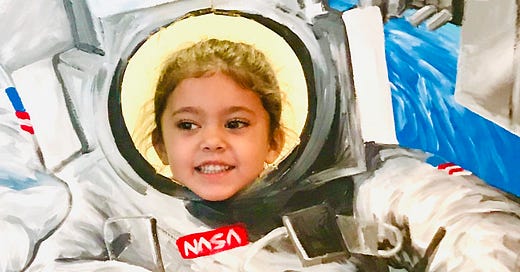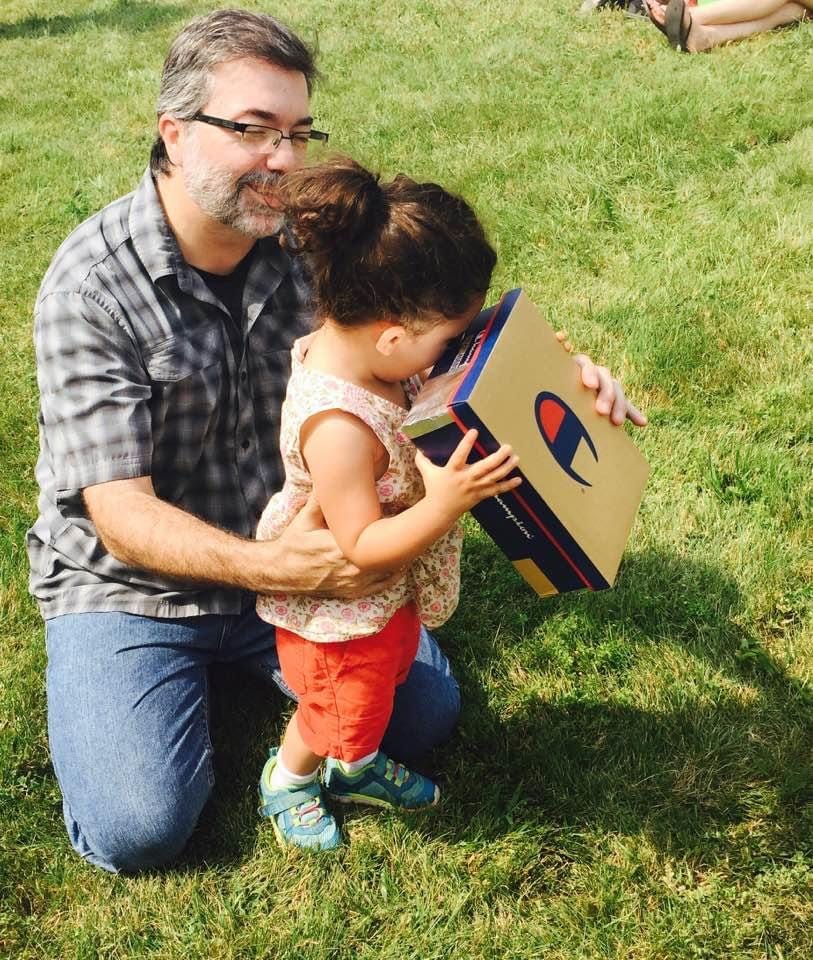NASA’s Artemis Program has begun.
Early in the morning yesterday, Artemis 1 finally blasted off, a powerful, unmanned orbiter designed to loop around the Moon, take a bunch of readings and come on back home. Eventually, Artemis will send humans to orbit the moon, then land, then set up a Moon base.
Now, I think that’s pretty neat.
When I was barely three, my father sat me down in front of our grandma’s TV where the family had gathered to watch Neil Armstrong bounce down onto the surface of the Moon for the first time. I’m told that I was quiet and fascinated by the spectacle.
In retrospect, this seems unlikely. The first steps took place at nearly 11pm on a Sunday and I can’t imagine being able to stay up that late. Perhaps they showed me replays. Maybe my parents just talked to me about it. Whatever the case, I have no memory of the event.
What I DO remember is that stars and space travel playing a big role in my young life. From reading the first book I remember, “The Runaway Robot” by Lester Del Rey to a trip to Florida with my family where I got to see the orbiter shuttle Enterprise, my youth was spent looking up.
When Little Bean came along, I wanted to pass some of that wonder on to her. I wanted her to look up into the endless space and feel, like I did and like I do, how remarkable it is that we’re here at all.
And so, for today, I’ve gathered that story together for you in four parts. These essays and poems run the gamut between having been published in publications of the time (The Monandnock Underground and Manchester Ink Link for example) to being unpublished social media reflections to getting a little editing treatment just for you dear readers today.
Our greatest strength is to understand how small we are in the vastness of, well, everything. And how lucky.
2018 - MY STARDUST MELODY
The other day, your mother and I were talking about something that happened years before you were born, and you asked why we didn't take you along.
“That was way before you were here, baby,” your mother said.
“Before I was in your tummy?”
“Before that,” I said. “You were just stardust, up there in the universe, just waiting for somebody to bring you home.”
Surprisingly, you didn't ask me what the heck I was talking about. Being stardust seemed reasonable.
Neil deGrasse Tyson spills a lot of ink talking about the connectivity of our own atoms to the universe, how we are not figuratively, but literally stardust. “It’s not that we are better than the universe, we are part of the universe. We are in the universe and the universe is in us.”
How reassuring, then, to be OF and to be UNIQUE at once. To be a daughter of the cosmos and to be our own specific, universal bundle at the same time.
To have you – and for you to have us – as the briefest of flashes against the backdrop of the endless darkness and then to return to the darkness. Each of us our own pinprick flash of light, like millions of light bulbs exploding every moment. Individually, providing barely enough light to matter, but as a whole, lighting up the world.
As a boy, I never set my sights on being an astronaut, or NASA. Though I was deeply interested in space in the way that most children are drawn to the mysterious and unknown. I loved science fiction and movies about space ships and exploration. I loved reading about robots – memorized Asimov's Three Rules of Robotics; felt drawn to the concept of created life, felt sorry for Frankenstein's monster and the Runaway Robot alike.
I remember a moment in my parent's car coming home at night from a family visit and watching the moon out my window, and asking, “Daddy, why is the moon following us?”
But I never actually wished to leave the Earth. Do you, baby? Over the last few months, we've seemed to breach the subject of infinity over and over. Why is it sometimes cold and sunny at once. Can we go to Jupiter? Why is Earth called Earth? How far to the moon? Sometimes I don't know the answers and we'll learn them together. Sometimes, I get the feeling that you're more interested in the questions than in the answers.
There are real answers to all these questions, grounded in astronomy and physics; but how miraculous is it, my stardust child, that you are even here to begin with, asking them.
2020 - BEING BEHIND US
Holding you in my lap and arms for the kind doctor,
The one that has taken care of you since you were a baby,
The doctor you don't recognize behind the plastic and shields,
"Guess I look like an astronaut," she says, and we laugh, but it's not funny,
And it hurts, that swab, not a tickle at all,
And your ear still burns, and being here
Feels like a gamble, like the air is an antagonist,
You cry a little while we wait for results, but only a little,
Because you're tough as hell, like your mother,
And by the time all the results come back, all negative,
Just a little infection maybe, nothing to worry about,
By that time, you're fine and you trade the worry
For a grape lollipop and we walk back to the car hand in hand,
But you leave your mask on,
"It makes my face warm, daddy"
And I white knuckle the wheel for a long moment,
Breathe, get it under control for God's sake, and wonder,
What will this look like when it's behind us.
What will being behind us even mean?
2021 - SPACE HELMET
Her: Daddy, do we have a space helmet and space suit?
Me: Wha...?
Her: A space helmet and-
Me: No, I heard you. Just, why do you want that?
Her: To go to space.
Me: Yeah, but why, do you want to be an astronaut?
Her: No. I want to grow potatoes.
Me: ...
Her: You can grow potatoes in space you know.
Me: I did not know that.
Her: Yup.
Me: Well, we don't have a space suit so we might have to just grow them in our garden.
Her: *sigh* Fine.
2021 - ON CAPTURING A TINY SLICE OF RED STARDUST
On a snowy evening in February, only minutes after hearing it myself for the first time, I sit down on the side of Little Bean’s bed and que up a recording on my phone.
“I’d like for you to listen to something,” I tell my six-year-old. “I want you to close your eyes and try to guess what it is you’re hearing.”
She’s game for a challenge like this. She puts her hands on her lap, leans back and closes her eyes. I hit play.
For about 15 seconds, we sit in silence listening to a small thudding sound. At one point, the pitch goes very high, then tapers off.
“Any guesses?” I ask when the recording finishes.
She pauses for a long time, then says, “Is it snow blowing?”
I kiss the top of her head. “Mostly right, not snow though. What you just heard is the first recording ever made of wind on Mars.”
NASA’s Perseverance rover had just transmitted the first sound from the red planet, a mission I had watched with all the fascination of little toddler me sitting on the floor of my grandmother’s house on July 20, 1969. Sadly, my memory of the first moon landing is fuzzy at best, though my parents insisted that I watched intently. No matter. I’ve been a space junky ever since, from science fiction to NASA, culminating in my having the honor of watching the Space Shuttle Discovery launch in 1988.
With my daughter, we’ve built a solar viewer to watch an eclipse, puzzled over the naming of constellations and watched with joy as SpaceX launched the first humans to the space station from American soil since 2011. In other words, I’ve done everything in my power to develop in her a taste for stardust.
“No one has heard that?” she asks. “Are we the first?”
“Well, I mean, the scientists and astronauts have.” I fumble for the proper context. “But to just regular humans, no one has ever even heard sound from Mars.”
NASA has a Kids Club where little ones and their parents can log on and learn about space and the universe. The site is full of silly illustrations of odd-looking space aliens and rocket ships, but the language is sound. The first question kids encounter is Why do we explore?
To any parent with a little one, they have seen this concept in action, sometimes frighteningly so as kids can be the ultimate explorers. After all, to a toddler, exploring a backyard where the concept of bees or bites or burns has not yet settled into balance with caution, exploration can be as risk laden as flying to Mars.
As parents, my wife and I have worked hard to make exploration of her environment a normal, everyday part of Little Bean’s world.
So, why do we explore? Because that’s the best way to understand.
Simple really, until the day your little one walks up to you with a stag beetle clamped onto her pinky finger. On those days, it’s easy to think that maybe staying inside with a good book is the best policy.
Still, wind on Mars is neither an angry backyard bug nor a path toward her being an astronaut. What I hope it is though is the beginning of knowledge, of what Ralph Waldo Emerson called a “happy talent.”
My swing for the bleachers, though, seems to result in a strike. Little Bean just smiles and returns to her tablet puzzle game. But I misinterpret her actions. As I’m getting up to go, she says, “Daddy, hang on, play the sound again.”
She opens her computer to the recording app and holds it up. “Here, record the wind.”
I turn on my phone and hold it close to her tablet as she hits record, and the two of us listen to Mars wind once again.
“For later,” she says, by way of explanation. There’s a poem there, somewhere in the vast expanse of those two words, in her willingness to hold on to the sound of that wind, in the way the writer Khalil Gibran talked about turning the wind into a “song made sweeter by his own loving.”
For now, the capture is hers; the sound of a windy day in the Jezero Crater on Mars, now a digital file on a little girl’s tablet 135 million miles across the solar system. The cosmos speaks. We listen.






